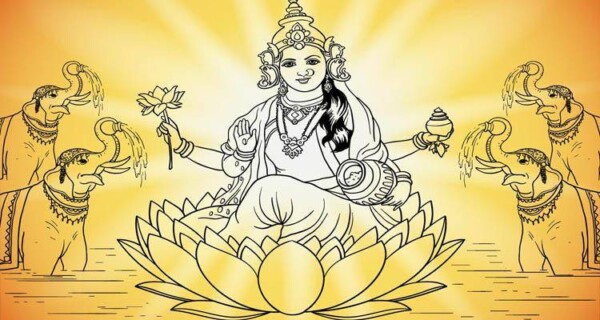Think of Lakshmi – the Hindu goddess of prosperity – and you are most likely to remember her as a radiant woman sitting submissively near Lord Vishnu’s feet, massaging them. The goddess of wealth is in eternal service of her lord and master, Vishnu, who sustains the universe. She is his shakti of material might, which is needed to run the affairs of life. But Lakshmi’s character is not as subservient or complementary as it seems. At least not in the beginning of her story…Everyone wanted Goddess Lakhsmi but no one could have her.
The story of Goddess Lakshmi
We are first introduced to a goddess called Shri in the Vedas, where she is called the bestower of lustre, prosperity, power, fortune, kingdom and other such gifts. When she is born from Prajapati’s ministrations, she is coveted by all the gods.
They want to kill her and take away her endowments, but are taught by Prajapati that one may enjoy gifts without destroying the source of those gifts.
From then on, Shri becomes the object of desire for all gods and the string of her divine liaisons starts. By the Puranic period, Shri, now identified as Shri-Lakshmi, has many stories, and as is wont to be, each story has many versions.
As one of Daksha Prajapati’s numerous daughters, she is given to Dharma (i.e. Yama) as his wife. Another story states her association with Soma – the god of the moon, vegetal life and/or the divine drink. Next she is associated with Indra as his consort. With Lakshmi by his side, Indra rises to the height of glory among gods.
Related reading: The story of Ahalya and Indra: Was it really adultery?
Lakshmi takes the asuras side
But that is not to be, for when Indra is beaten by Bali – the valiant demon king, Lakshmi leaves his side. She lives alongside the asuras, including Prahlada and this grandson, Bali, making their kingdoms perfectly prosperous. In some tales, she is also associated with the king of yakshas – Kubera, who, like her, lords over all wealth. Lakshmi does not discriminate and belongs to those who treat her with reverence and adoration. Thus, it appears that Lakshmi goes with the victor; indeed, prosperity follows success.
So short-lived is Lakshmi’s company, that one of her given names is Chanchala – the restless one. This must obviously be seen as a metaphor for the fleeting nature of good fortune – something most of us are familiar with. But this goddess’ character also serves as a metaphor for a fine yet fickle woman who everyone wants but none can truly have.

The twist in the tale
There is a twist in the tale, of course, with Vishnu entering the picture.
When amrita has to be obtained, the primeval waters of the ksheerasagara must be churned. Vishnu, who has by this time become a prominent god, takes on the managerial mantle for this grand cosmic event. He brings the two warring parties together – the devas and asuras – and coaxes them to collaborate. He enlists Shiva’s serpent Vasuki as the churning rope and Shiva himself to deal with the terrible halahala poison. He himself takes on two pivotal roles in the project, including providing a base in his kurma (tortoise) form, and later, (unfairly) distributing the amrita in his Mohini form. Vishnu is clearly the boss in this scheme of things.
As the ocean starts yielding its many treasures, the devas and asuras claim them one by one. Vishnu stands aside – perfect in his non attachment and power – watching the goings on.
When Lakshmi – the brightest of all oceanic treasures – emerges, Vishnu is still as unmoved. It piques Lakshmi’s interest to see this resplendent god, who is unlike anyone else from the present coterie. In the midst of the clamour to possess her, Vishnu’s composure is the perfect foil. Lakshmi recognises his leadership, regality, and most of all, his equanimity. Lord Vishnu seems like the perfect partner, and Lakshmi lets her choice be known to all by placing a garland around his neck.
Related reading: For the Love of Krishna
Lakshmi wilfully gives herself to one who does not chase her, and stays loyally by his side forever after.
There is an unmissable lesson in the story, rather stories, of goddess Lakshmi. Admittedly, the character of the goddess undergoes a sea change from the Vedas to the Puranas, but there’s at least one conclusion to be drawn. One cannot or should not chase after wealth or love. Neither can one force them to stay. They can only be mastered by confident detachment or in other words, if you love something, set it free.
7 People Share The Worst Things Their Marriages Have Ever Survived
It is Hard To Believe but the Love Between Shiva and Sati is still Relevant Today
Your contribution does not constitute a charitable donation. It will allow Bonobology to continue bringing you new and up-to-date information in our pursuit of helping anyone in the world to learn how to do anything.























Featured
19 Spiritual Signs Someone Is Thinking About You Sexually
7 Signs Someone Is Constantly Thinking About You – It’s More Than Just Coincidence
Seeing 222 When Thinking Of Someone – Meanings And What To Do
Your Guide On Numerology Compatibility – What’s Your Life Path Number And Who Are You Most Compatible With?
Twin Flame Reunion – Clear Signs And Stages
Psychic Expert Shares 21 Spiritual Signs Your Ex Misses You And Wants You Back
What Is The Spiritual Meaning Of Being Pregnant In A Dream? 7 Possible Explanations
17 Powerful Signs From The Universe Your Ex Is Coming Back
What Is Agape Love And Its Role In Modern Relationships
Sexual Ties: Meaning, Signs, And Tips To Break Away
21 Miraculous Prayers For Marriage Restoration
Psychic Expert Shares 11 Spiritual Signs He Will Come Back
15 Angel Numbers For Love And Relationship
10 Signs You Are In A Spiritual Relationship With Someone
11 Beautiful Ways God Leads You To Your Spouse
What Does Yin And Yang Mean And How To Find The Balance
Everyday Yin And Yang Examples In Relationships
8 Types Of Soulmates And Deep Soul Connection Signs
Cosmic Connection — You Don’t Meet These 9 People By Accident
21 Beautiful Prayers For Your Husband For Everlasting Love